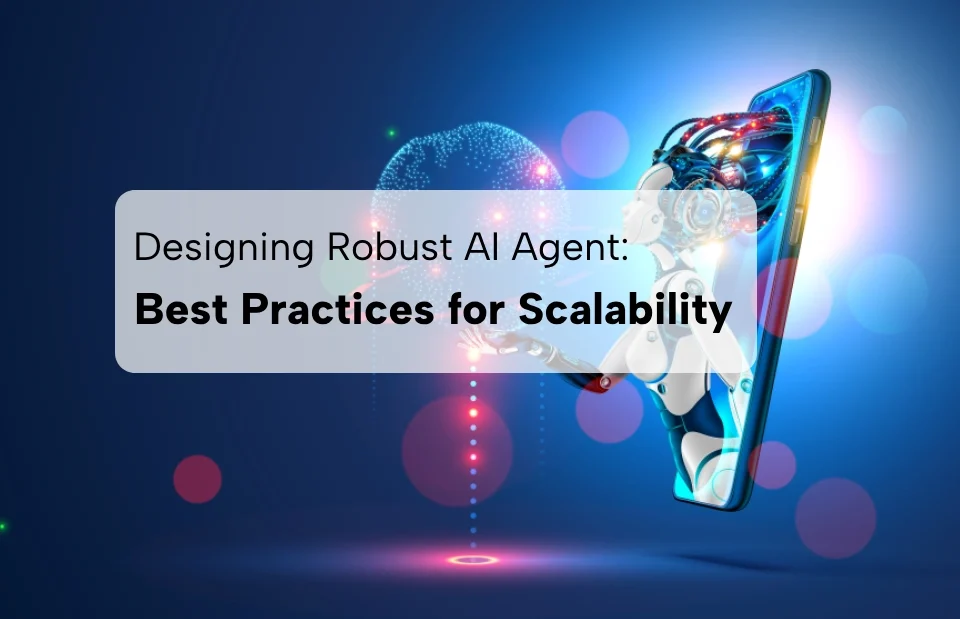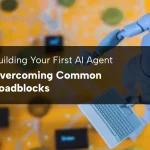AI Agents stand as one of the most potent tools for businesses in the current, fast-paced tech world. Many leaders find it hard to grasp what these tools are, how they work as well as how they improve business processes, despite their rising importance. This thorough guide wants to explain AI agents to those leaders, giving simple insight into their power, uses next to possible profits.
To understand them, AI agents are computer systems which operate on their own or with limited help. These systems watch their surroundings, decide what to do along with act to meet certain aims. In contrast to regular software, which just does what it is told, AI agents gain knowledge, adjust along with choose wisely based on info and situations. This creates a key distinction between these agents and typical automation.
Table Of Contents
Understanding AI Agents
Definition and Core Concepts
In simple form AI agents exist as software programs. These programs understand their surroundings, decide on actions next to then act to reach defined targets. The programs possess different levels of self-governance. Regular software uses set instructions but AI agents shift behavior based on gained knowledge and observations.
Consider an AI agent as a worker in digital form who has specific duties. The agent receives information from its area, such as data, demands from users next to states of systems. It works on this information by using algorithms and models. Then it creates outputs, for example actions, suggestions or more queries.
Today’s AI agents differ because they can manage hard information besides form conclusions that once needed a person’s assessment. They do not just use inflexible “if-then” rules. They travel through intricate situations with notable adaptability.
I recall conversation with a leader in manufacturing. At first this person rejected AI agents as merely another tool for automation.
Six months after implementing them for quality control, he admitted, “These systems aren’t just following orders—they’re finding inspection problems my team never even thought to look for.”
Evolution of AI Agents in Business
The journey of AI agents in business settings has been fascinating to watch. Early business applications were limited to simple automation tasks—chatbots answering basic customer questions or programs monitoring network security.
Today’s business AI agents are dramatically more capable. They can handle complex workflows spanning multiple systems, understand context across conversations, and even collaborate with other agents and humans as part of larger processes.
This evolution mirrors what happened with enterprise software generally. What started as isolated tools became integrated systems that now serve as the backbone of business operations.
Types of AI Agents
Reflex, Utility-Based, and Learning Agents
AI agents come in several flavors, each with distinct approaches to decision-making:
Simple reflex agents
operate on basic if-then principles—when they observe a specific condition, they take a predefined action. These are useful for straightforward tasks like triggering alerts when inventory falls below threshold levels.
Utility-based agents
evaluate multiple possible actions and select the one expected to maximize some measure of success. For example, an agent might weigh different pricing strategies based on market conditions, competitor behavior, and historical sales data before recommending the optimal price point.
Learning agents
improve their performance over time through experience. These systems start with initial knowledge but refine their approach as they collect more data, making them increasingly valuable for complex domains where rules are hard to define explicitly.
One banking client I worked with deployed all three types across different functions. Reflex agents handled fraud detection alerts, utility agents managed portfolio allocation recommendations, while learning agents gradually improved loan application assessment accuracy.
Some agents are also classified by their level of autonomy:
- Assistive agents augment human work by providing information and suggestions
- Delegated agents handle entire processes with minimal supervision
- Autonomous agents make and execute decisions independently within defined boundaries
The right type depends entirely on your business needs and comfort level with automation.
Why Businesses Need AI Agents
Benefits in Efficiency and Decision-Making
The business case for AI agents typically centers around three core advantages:
First, they excel at handling routine tasks at enormous scale. An AI agent handles many customer requests. It also watches a lot of transactions to find fraud. It checks countless documents for compliance problems. The AI Agent does all this without getting tired and the quality never goes up or down.
Second, they bring consistency to decision-making processes. Where human judgment might vary based on mood, energy levels, or unconscious biases, AI agents apply the same careful analysis to each situation.
Third, they can operate continuously, providing 24/7 coverage without the constraints of human work schedules.
But perhaps most compelling is how they free human workers to focus on higher-value activities that require creativity, emotional intelligence, and strategic thinking.
A healthcare administrator once told me, “Our scheduling agents didn’t just save time—they transformed our staff’s experience. Nurses who used to spend hours juggling appointments now spend that time with patients instead.”
That said, AI agents aren’t without challenges. They require careful design, quality data to learn from, and thoughtful integration into existing workflows. The most successful implementations I’ve seen treat agents not as replacements for human workers but as tools that amplify human capabilities.
Common Use Cases for AI Agents
Agentic AI in Law, Finance, Healthcare, E-commerce
Across industries, businesses are finding innovative ways to deploy AI agents:
In legal settings, agents help review contracts, identify potential compliance issues, and surface relevant case precedents. One law firm reduced document review time by 70% by deploying agents that pre-screened materials before attorney review.
The financial sector uses agents for risk assessment, fraud detection, and personalized financial advice. Wealth management firms now serve clients with smaller portfolios profitably by having agents handle routine portfolio rebalancing while advisors focus on complex planning.
Healthcare firms use software for patient assessment, session arrangements as well as initial health guidance. These resources help with personnel deficiencies and they boost patient admittance to treatment.
In electronic commerce, software customizes shopping, organizes stock, sets prices next to processes standard customer requests. They are helpful to smaller sellers as they fight larger corporations like Amazon.
But the notable element from these cases is technology blends in. People do not know they converse with an AI agent – instead, they see the operations grew simpler and more reactive.
That seamless integration represents the ideal state for business AI agents. They should solve problems without creating new ones or requiring users to develop specialized skills just to work with them.
Implementation Considerations for AI Agents
Before rushing to deploy AI agents, consider these practical questions:
What problems are you trying to solve? Good system upgrades concentrate on definite business issues rather than just install new tech for no reason.
How will you measure success? Define clear metrics—time saved, error rates reduced, customer satisfaction improved—to evaluate your agents’ performance.
What level of autonomy is appropriate? Match the agent’s decision-making authority to both the task requirements and your organization’s comfort with automation.
How will agents integrate with human workflows?
Develop systems in which humans and AI Agents enhance one another’s advantages instead of running separately.
The solution depends on the sector, company culture along with use cases. A process suitable for a fast moving technology business may be irrelevant for a highly regulated financial institution.
In Summary
AI agents represent a major shift in how companies handle information processing and decision-making. They’re not simply faster versions of traditional software—they bring new skills for taking care of hard, complex and unclear cases that usually need a human mind and judgement.
As these tools continue to evolve, the companies that benefit most will be those that seamlessly integrate them into their systems, matching agent capabilities to business needs while maintaining appropriate human oversight.
The question for business leaders isn’t whether AI agents will impact their industries—it’s how quickly and dramatically that impact will arrive, and whether they’ll be positioned to take advantage of the opportunities these technologies create.
If you’re considering how AI agents might fit into your operations, start small with clearly defined use cases where success can be easily measured. Then gradually expand based on results and lessons learned.
The most important step is simply beginning the journey towards AI automation. In a business landscape increasingly shaped by intelligent automation, familiarity with AI agents isn’t just beneficial—it’s becoming essential.
Find how AI agents could meet your workflow Automation—book a free consultation.

Dhruv Dholakia has spent over a decade helping enterprises streamline operations through workflow automation and digital transformation. With a strong belief in building purposeful tech, he now focuses on the next frontier—custom AI solutions and Agentic AI. For Dhruv, AI isn’t just a buzzword; it’s a tool to solve real-world problems and create lasting impact. He’s passionate about making AI accessible, responsible, and truly useful for people, teams, and businesses navigating today’s fast-changing world.





